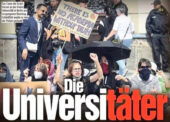The Federal Administrative Court rejects an appeal by the Office for Migration and Refugees. Instead of demanding the handover of mobile phones and log-in data, asylum authorities must choose milder means
The Federal Administrative Court in Leipzig has ruled that the mass screening of mobile phones by the Federal Office for Migration and Refugees (BAMF) is not covered by the law. The judges argued that the regularly conducted analysis of digital data carriers in the absence of passports or passport replacement papers was carried out without sufficient consideration of other existing findings and documents. The order to the plaintiff to provide log-in data for her mobile phone is therefore also unlawful.
The court thus upheld the complaint of a 44-year-old woman from Afghanistan who, together with the Society for Freedom Rights (GFF), had gone to the Administrative Court in Berlin two years ago against the mobile phone analysis. The Berlin court had already found the measure unlawful. Because the practice affects the fundamental rights of thousands of refugees in other federal states as well and the case is therefore of fundamental importance, the administrative court, with the consent of the GFF, allowed an appeal directly to the highest court. This appeal by the BAMF has now been rejected by the Federal Administrative Court.
When scanning the mobile phones of asylum seekers, the authorities make a copy of the content on them and analyse it. The measure is intended to make it possible to establish identity and nationality if the applicants cannot produce a valid passport or passport substitute. Foreigners authorities are also allowed to search the data carriers of undocumented persons in order to determine the destination country of a deportation.
The authorities check whether there are frequent country codes in the address book or in calls and messages that correspond to the home country mentioned in the hearing. Websites visited are also searched for such country endings. From photos and apps installed on the phone, the BAMF extract geodata in which the past locations are stored. In addition, the log-in names of various apps are listed.
In order to prevent “asylum abuse” and to be able to enforce the obligation to leave the country, the Bundestag tightened the Asylum Act in 2017 and created the legal basis for the forensic mobile phone readouts. According to this, first-time applicants without passports or passport substitutes must hand over existing mobile phones. If the duty to cooperate required by the law is refused, benefits can either be reduced or an asylum application can even be considered withdrawn.
As of August 2022, according to the Federal Ministry of the Interior, 30.6 per cent of asylum seekers had stated that they had a “data carrier device” when they applied for asylum, according to the answer to a parliamentary question by Clara Bünger, a member of the Left Party. However, “so far no coercive measures have been threatened or carried out”.
According to the ministry, 80 per cent of all devices obtained could be “technically read out”. In an answer to a parlamentary question it said, technical problems “mostly occurred when connecting older mobile data carriers”, for example when USB connections were missing on the devices.
If the applicants do not comply with the request to hand over the password, according to § 15a of the amended Asylum Act in conjunction with the Residence Act, the responsible telephone or internet companies can be requested to provide access data. The BAMF is even permitted to do this with children’s devices.
Actually, the BAMF is only allowed to use the mobile phone analysis as a last resort. Before that, the decision-makers are supposed to dispel doubts about the identity by asking specific questions about the country and place of origin during the asylum hearing. This has now been confirmed by the court in Leipzig.
The intrusive measure is not particularly effective anyway. By August, the BAMF had already read out more than 16,000 devices last year, mainly from people from Afghanistan, Syria and Iraq. In about 4 per cent of those concerned, the identity had allegedly been disproved.
“The ruling is a great success for the data protection of refugees,” commented Lea Beckmann, lawyer and complainant before the Federal Administrative Court. “It is clearly illegal for the BAMF to analyse mobile phone data on retention. This must stop now.”
Published in German in „nd“.
Image: BAMF (German government).





Leave a Reply